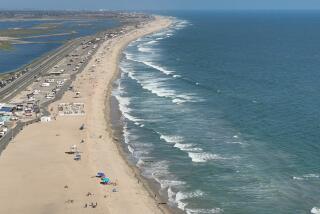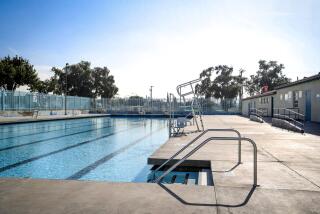Making Waves : After Diving Injury, Lifeguard Works to Make Beaches Accessible to Disabled
- Share via
SAN CLEMENTE — From the passenger seat of a lifeguard Jeep, Scott Stuart dropped to the beach and pulled himself into the crashing gray surf for his ritual morning swim, his paralyzed legs leaving a squiggly trail in the sand.
On other mornings, if the conditions are right, the state lifeguard, who was partially paralyzed in a diving accident four years ago, hits the waves on his customized surfboard, riding on his stomach as if he was on a bodyboard.
Stuart, 36, a strong athlete and a state lifeguard since 1974, has pushed the limits of his disability in keeping the surf and sand a major part of his life.
Now he is turning his energies to making the beach more accessible to others with disabilities, leading a campaign to buy special sand-traction wheelchairs for at least two Orange County state beaches.
“This will be one more step toward independence for all disabled people,” Stuart said. “It’ll eliminate depending on others to carry them through the sand.”
As a lifeguard, Stuart has dived into the ocean countless times to rescue swimmers. But it was a fateful dive into a shallow pool four years ago in Costa Rica that nearly cost the San Clemente resident his life.
The accident left Stuart a quadriplegic, although he has since regained full mobility in his arms and dexterity in most of his fingers. With the help of a walker, he can also take small steps.
In the long months he spent in a hospital after the accident, doctors were not sure if Stuart would be able to return to his job, much less surf, hang glide and play the bass guitar again.
But Stuart, with what friends describe as “unrelenting perseverance, a mule-ish will and fireball personality,” has achieved more than anyone would have expected.
Stuart was reassigned as a lifeguard dispatcher after his accident and spends his days surveying the sea from a tower on the bluffs overlooking the San Clemente beach, watching for riptides and sending help when he spots a swimmer in trouble.
Not surprisingly, he was named “most improved” and “most inspirational” by his colleagues at the recent end-of-the-summer lifeguard celebration.
In addition to swimming and surfing, he hang glides, a sport he discovered years before the accident. His glider is equipped with wheels, allowing his friends to roll him off cliffs.
“I want to be out of my chair, in my glider, on my surfboard,” he said.
He also wants to make the beaches more accessible to people with disabilities.
Stuart recently started a fund-raising drive for the nonprofit State Lifeguard Assn. to buy sand-traction “surf chairs” for Doheny State Beach in Dana Point and San Onofre State Park, two of the more accessible beaches in south Orange County for disabled people.
State lifeguards at Doheny, San Clemente and San Onofre beaches receive 10 to 15 requests a week during the summer to help disabled or elderly people through the sand, Stuart said.
The customized wheelchairs, which are made by a Florida company and cost $900 each, are equipped with large dune buggy-type tires that allow people to easily push them through the sand.
“Everyone in a chair wants more freedom and more independence,” said Stuart, who, like others with physical challenges, depends on lifeguards to drive him to the waterfront when he wants to swim.
Stuart started the effort to buy the chairs at the request of Laguna Niguel residents Michael Laux and Pat Demar. Demar has Lou Gehrig’s disease, a degenerative condition of the central nervous system, and is confined to a wheelchair.
“She’s always loved the ocean, but she obviously can’t get to it in a regular wheelchair,” Laux said. “Right now, she does not go down to the water. It’s kind of humiliating to ask a lifeguard to come down and pick you up. It’s a big scene, not worth the aggravation involved.”
To help with the fund-raising drive, Demar has drawn up a list of businesses and Orange County surf firms to target for sponsorship.
“Right now, most people in wheelchairs cannot get to the water,” Laux said. “We would love to do anything to make this happen.”


